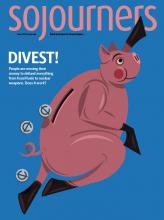This is an introduction to a five-part series in Sojourners' June 2015 issue about divestment; to read the rest, click here.
IT WASN'T A HUGE surprise last year when Union Seminary announced that it would become the first seminary in the world to divest from fossil fuels. Union, after all, has long been a leader in progressive causes, and President Serene Jones said that “divestment of our endowment from fossil-fuel companies is one small step” toward stopping the catastrophic threat—the “sin”—of climate change.
But a few months later, the divestment movement reached an altogether different level when the Rockefeller Brothers Fund announced that it was moving its money from fossil fuels, starting with the worst carbon polluters, coal and tar sands. The Rockefeller money, of course, came from oil—patriarch John D. Rockefeller was the co-founder of Standard Oil—and the Rockefeller Brothers Fund controls $860 million in assets. All in all, 180 institutions have pledged to divest more than $50 billion to defund climate change—and, as they say, with billions in assets moved, pretty soon you’re talking real money.
Read the Full Article
